Israeli citizens were tortured in Belarus prisons
17 August 2020 | Darya Kostenko, Details
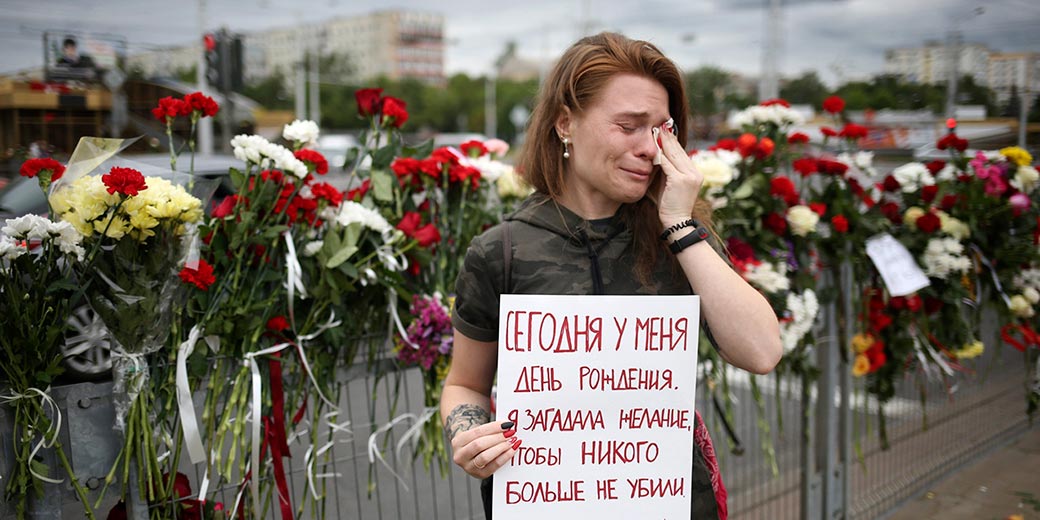
At least three citizens of Israel were detained in Belarus over the last few days by Lukashenko’s security forces. Two of them also have Belarusian citizenship, by virtue of not renouncing it during repatriation. “Details” [the original news outlet name] was notified about the release of one of them, Artyom, several hours before this publication. It is confirmed that he was severely beaten. Relatives of the detainees were warned against talking to the press, under the threat of even more cruel torture of their loved ones. Alexander Fruman, a 40-year-old, is another Israeli citizen who was tortured. He was detained in prison for three days. “I consider it my mission to tell everyone what’s happening there,” he said.
Part 1. Minsk
The grandson of a woman who survived the Holocaust was tortured in Minsk
Alexander Fruman was repatriated from Minsk in 1998, served in the military in the Givati brigade, finished Jewish University, and worked in Bituah Leumi and the Bank of Israel. He lives in Modi’in and leads a team of data analysts in a large financial platform, Investing.com.
“We’d been planning a trip to Belarus for a year,” said Alexander. “I wanted to show my wife Minsk, the city where I grew up. We also wanted to visit Polesie, where my family is from. My grandfather joined the Red Army in 1941 and died somewhere under Mahiliou, we don’t even know where he’s buried. His name is in the Yad Vashem museum. My grandmother miraculously escaped the Nazis. Many of her siblings and cousins died.”
Alexander’s son and wife arrived in Belarus back in July when the school year in Israel had ended. They were staying with Alexander’s relatives. Fruman himself arrived in Belarus on the 7 August. He rented an apartment in the centre of Minsk to show the capital to his wife – the city where he had spent his youth.
On the 10 August, the couple went out for a walk. It ended in a nightmare
“We spent the whole day walking in the parks, enjoying the clean and peaceful city without any unrest. We stopped at a big book store on Nezalezhnasci [Independence] Avenue, and bought three books in Russian for our son (he primarily reads Hebrew).
After that, we saw a yellow bus stopped on Independence Ave, next to which there were a pile of riot shields with the ‘Милиция’ [Militsiya – ‘Police’] insignia on them. I thought this would make an interesting photo and took a picture.”
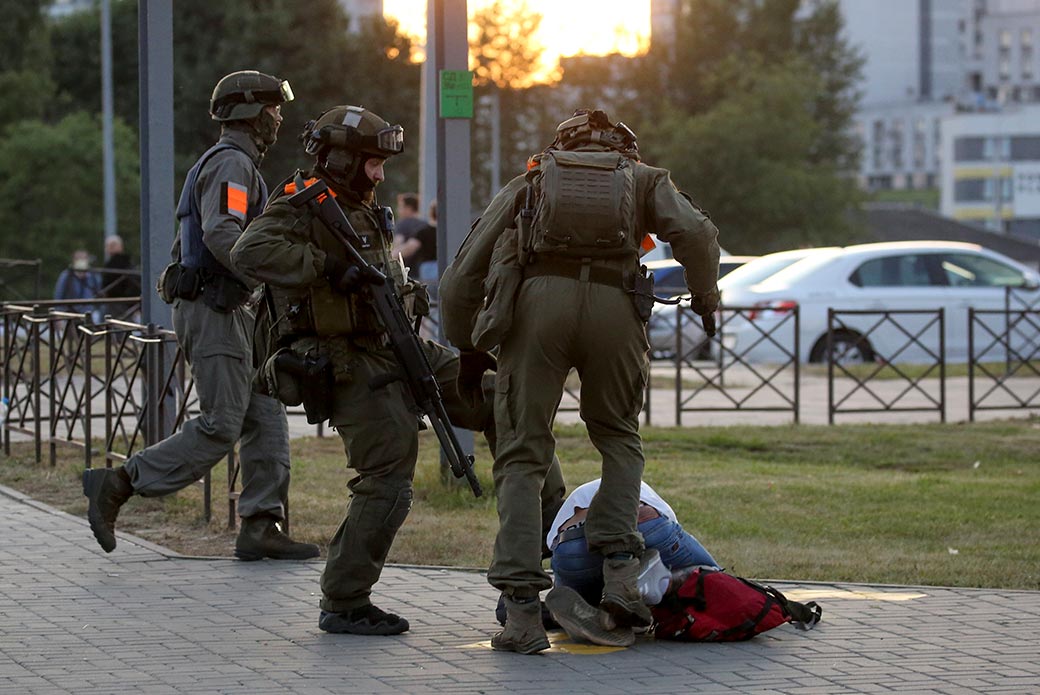
“At that very moment, seven OMON [riot police] officers jumped out of the bus, pinned me and started to beat me up right in front of my wife. Then they threw me into the bus and shouted: ‘Why were you taking pictures?’ I tried to explain that it was my attempt at artistic photography, but they screamed back: ‘You were taking pictures of the bus in order to plan an attack!’
I told them that I was a citizen of Israel and asked them to call the embassy. They responded with harsh obscenities and rude anti-semitic jokes… They said that my circumcision had been incomplete and that I needed to have it ‘repeated’. They threatened to kill me: ‘If you keep yapping about your rights and demand to call the embassy, you will never leave this bus.’
The bus was parked at a major intersection in the centre of Minsk, they just grabbed anyone passing by, and all I could do was sit and watch. I saw a guy carrying a bag leave the grocery store – boom! – and they got him too.
They blocked the sidewalk and the metro entrance, but there were people who simply lived around that area and were coming home from work. They approached the line of OMON and asked how they could get to their homes. The OMON responded with: ‘We’ll show you a way.’ Then they would grab these people and start beating them up.
They arrested a senior citizen in front of me just for having a white baseball cap with the Belarusian national symbol. Those who attempted to argue had their hands tied up with plastic zip ties. Those who talked back were severely beaten.”
The IDF experience helped a lot
Alexander spent 8 hours in that bus. Then, every one of the arrested was beaten up again while being loaded into a police truck.
“They brought a police truck and put it next to the bus so that nobody could see what was being done to us from the windows of the nearby buildings. On the 9 August, I saw detentions like these out of my own window. Now I know what they do to the people once they’re inside.
You put your hands behind your back, bend over so your head is as low as possible. They yell at you when it is time to go. On your way to the police truck, you pass through the line of OMON officers who beat you with the truncheons on your legs and stomach, who knee you in the gut.”
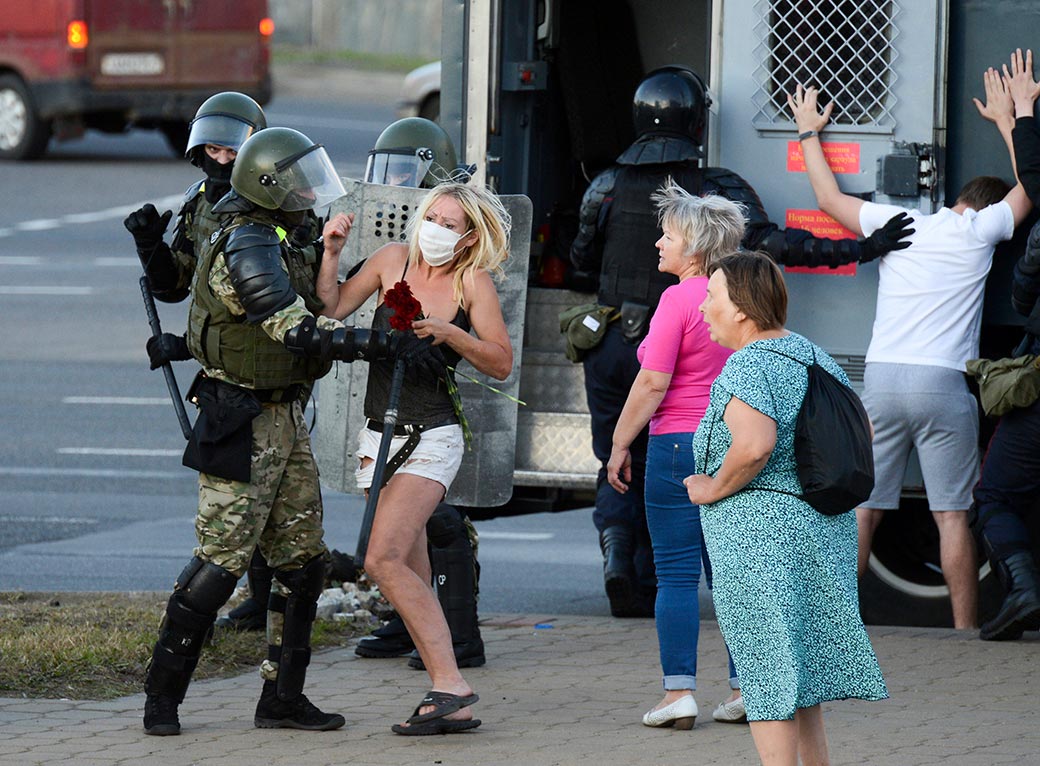
“I am a military man. I served in the Givati brigade in the beginning of the 2000s. I wanted to join the Lebanese army in 2006, my best friend died there… My military experience helped me here. I know how one can take a punch to minimize the damage. The OMON officer aimed at my solar plexus, but I regrouped so that he missed. For this, I was punished with a truncheon at once.
We were beaten and thrown into a police truck. Inside there are ‘glasses’ at the sides to the left and to the right. Those are tight sections designed for one person. Behind is a section for 4 people, but there were 10 of us standing huddled together. I heard a woman crying very loudly in a ‘glass’ next to me: ‘I have a heart problem, open the door!’ The OMON officers just laughed and cursed at her.
In the same truck with us, there was a guy who saw how they captured her. She is a 51-year old lawyer, former BSU [Belarusian State University] professor. She voted for Lukashenko during the elections. She and her husband own a shop in a shopping mall not far from the main avenue. The couple was going there. When they saw a chain of OMON officers closing off the street, her husband jokingly asked them: ‘Why can’t I go there? Is it because of the coronavirus?’
Several OMON officers immediately lashed out at him, started to beat him up, and dragged him into the police truck. The woman ran after them and cried, trying to protect her husband. Then several cadets from the Academy of the Ministry of Internal Affairs, who were helping OMON, jumped on her and started beating her severely. They punched her in the face and kicked her in the stomach. They continued kicking her even when she was lying limp on the ground…”
If there is Hell, “Akrescina” is worse
The detainees were transported to Sovietsky district police office. As Alexander recalls, on the way to this place they prayed that they wouldn’t be taken to another one – the infamous Offender Detention Centre on Akrescina Street in Minsk. People call it simply “Akrescina”. This is the detention centre where those who were arrested during protests are usually kept. Here is what Alexander said about this place:

“Akrescina is a torture chamber. There is Hell, but as people say, Akrescina is worse. I heard stories of men’s torn rectums. Men that come out of there don’t say anything, they simply weep. I gathered many such pieces of evidence.”
Belarusian media have already reported several cases of sexual assault against the detainees. For instance, 16-year-old Tsimur M., who is currently in the Intensive Care Unit of the 3rd Children’s Hospital in Minsk, has told his relatives that one of the detained men had a truncheon shoved down his rectum. Another arrestee, a 14-year-old teenager, was punched in his groin. Tsimur himself had a truncheon shoved into his mouth; they tried to squeeze out his eyeballs and severely beat him, according to the news outlet TUT.BY.
When Alexander’s batch of detainees was loaded off in the Sovietsky district police station, they were beaten up once more. They were bent over, with their faces against the wall, and tortured again. Alexander counted 61 other men there with him. The prisoners were beaten even for the slightest movement, even if they could no longer stand because of the pain and exhaustion.
“We stood bent so that our heads were at the level of our stomachs. We stood with our arms raised and spread apart, and our legs spread to twice the width of our shoulders. After 5 minutes in such a pose,your legs, arms, and neck stiffen up and your back and spine start aching.
The Chief of the Sovietsky RUVD [Regional Office of Internal Affairs] was personally leading the torture. He, in particular, seemed to really enjoy beating people. A young man with a broken and swollen arm stood next to me. He couldn’t hold it up anymore. The Chief of RUVD came up to him and said, cursing every other word: ‘Don’t you understand you are supposed to raise hands?’ The guy answered that he couldn’t because his hand was broken. Then the chief grabbed his hand, pulled it and smashed it against the fence. I later recognized his photo on the MIA [Ministry of Internal Affairs] website,” said Alexander.
“Details” located the name and the photograph of this man: Chief of Sovietsky RUVD of the city of Minsk, Sergei Leonidovich Kalinnik.
“He screamed: ‘Аh, so you are an Israeli citizen!’ Then he hit me in the stomach with a truncheon”
After their arrest reports had been prepared, the detainees were deprived of their documents and personal belongings. Throughout this entire process, Alexander repeatedly identified himself as an Israeli citizen and requested to call the embassy, but the only response he received was bullying and mockery.
After that, the arrestees were moved to the courtyard of RUVD. They were forced to stand with their hands behind their backs, bending low above barbed wire. It was unrolled on the ground in such a way that any punch could throw a person onto the barbs. And they punched for any movement.
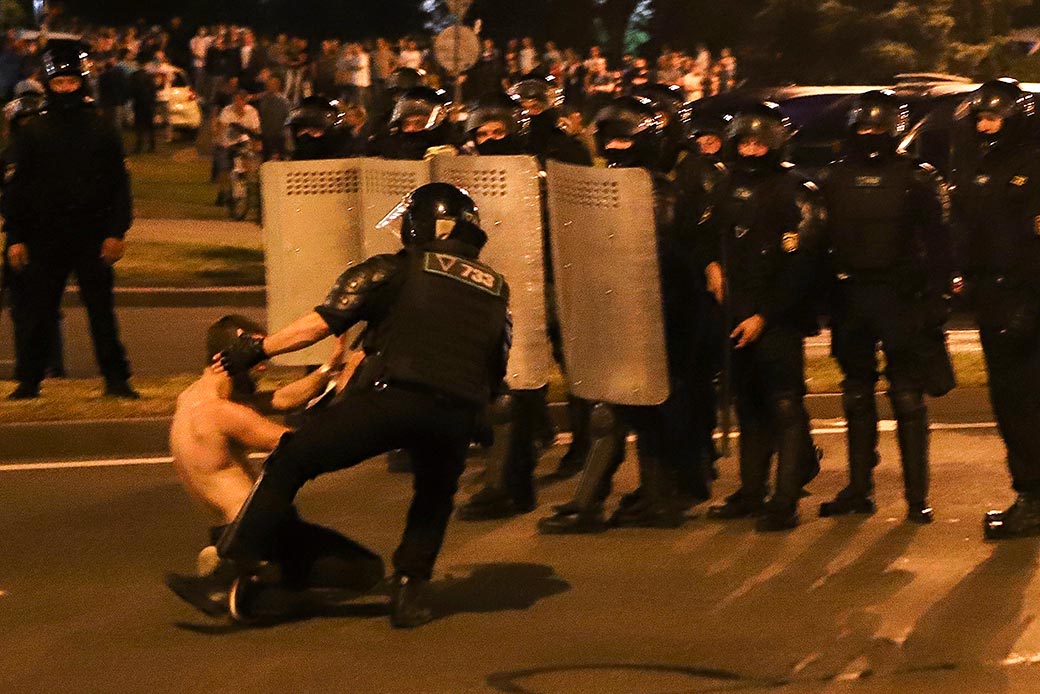
“You stand at the fence in an uncomfortable position, and in front of you on the ground is barbed wire. If you start falling, you will fall face down into it. We were too afraid to move. For trying to move your numb leg, you received blows with a truncheon. Thank God, no one fell.
One huge guard was wearing a helmet and a mask so that it was impossible to identify him. He shouted at the people to lower their heads even lower, and beat everyone. I saw him pass and tried to lower my head as low as I could. I thought he wouldn’t touch me, but no, he hit me anyway.
At this, I told him that I am a citizen of Israel and demanded that I be reported to the embassy. He shouted: ‘So, you’re Israeli!’ and hit me in the stomach with a baton. If I had kept silent, I would not have received this blow. And then he turned to his colleagues and said: ‘Look, we have a citizen of Israel here! Came here to destroy our country!’”
“If anything happens, we’ll shoot to kill!”
In the courtyard of the police department, they were told: “You are at a security facility. Try anything funny and we’ll shoot to kill.”
“We stood like that until 4 am. About once every two hours, we were given a single bottle of water for everyone there. It turned out that I could not drink, because there wouldn’t be enough for everyone. So I skipped my turn, firstly so that there would be some left for others, and secondly, so I would not have to go to the toilet.”
According to Alexander, when the arrested were taken to the toilet with a guard, good cop-bad cop games began.
“The one who takes you to the toilet starts to talk to you politely, asking who to call to inform about your detention, as if he is a good guy eager to help. I asked the guard: ‘Call the embassy, please.’ He answered me: ‘Of course, everything should be done according to the law.’ I was so moved that I told him: ‘I will put a note on the Wailing Wall for you and your family.’ But he didn’t call anyone, he was just playing a game. I realized that I was beginning to be affected by Stockholm syndrome, and drove those thoughts away from me.”
“It was unbearably cold”
In the courtyard of the RUVD, one could hear explosions and shots from the area around the “Riga” supermarket – it was one of the protest hotspots during the night of the 10th of August. But only a former IDF (Israel Defense Forces) soldier would recognize these sounds – for most Belarusians they were a novelty.
“We heard explosions and bursts of fire from that area. As a former military man, I immediately realized that these were flash-bang grenades and rubber bullets. We tried to whisper quietly amongst ourselves. The guys I was with were wondering what was happening, I was explaining it to them.”
The temperature outside dropped to 10 degrees Celsius just before dawn, but the prisoners continued to stand in the yard.
“I was wearing a T-shirt and knee-length denim shorts. The temperature dropped and I was freezing. Then they allowed us to sit on the asphalt with our hands behind our heads. But you get even colder sitting on the asphalt when it’s 10 degrees out.
I am a grown man, I went through a lot in my life, I can cope with situations like this. But this 51-year-old woman, Natalia, stood with us and did all the same things we did… I don’t know how she could bear it…
We waited for dawn like the coming of the Messiah. We were all terribly cold.”
Alexander says that with them in the yard, there was a mentally disabled man who behaved “like a six-year-old child.” His name is Artyom Shimansky, who at the time of this publication remains in prison.
“When he was ordered to raise his hands, he would smile and say: ‘I won’t, I’m tired, I can’t stand like that anymore.’ For this, he was beaten with truncheons and punished even more severely than us. Everyone around him understood that he was disabled, and that he behaved this way because of it. Why the police did not understand this is a mystery to me.
When the sun came up and began to warm us, it was such a joy! We were allowed to sit down on the asphalt again, even lean on our hands, but were ordered to look only straight ahead. We relaxed. And this guy Artyom… He kept looking around and smiling all the time. He looked like he was on some kind of an adventure. And then they punished us all for his disobedience. They made us stand up and bend over again – and kept us like that for an hour. Punishment for all because of a disabled man disobeying their orders.”
According to Alexander, while in the courtyard, he heard people being tortured inside the RUVD building. Those people were arrested that night near the “Riga” supermarket, where they had attempted to build barricades.
“I heard terrible screams, and the thud of truncheons coming in contact with the bodies. OMON shifted all their anger to those people, which might have saved us from more cruel tortures.”
Part 2. Zhodzina
“A real Gestapo”
Around 11 am, those arrested began to be transferred to a detention facility, located in Zhodzina, greater Minsk. They used two prison trucks. The OMON officers in charge of loading prisoners selected anyone with a remotely extraordinary appearance: people wearing clothes with national Belarusian symbols, guys with long hair or tattoos. It is rumoured that the torture in this prison truck was even more cruel. What Alexander went through during the transfer is, similarly, most reminiscent of the Gestapo’s actions.

“The people in the prison truck laid atop one another. The guy under me lost consciousness. This is how it happened: a person would be made to kneel, with hands behind one’s back, bent forward with one’s head against the floor. I am behind this person, also kneeling, leaning onto them.
The stronger built men would have their hands tied with cable-ties so tight – they went blue. Some managed to stretch the ties a bit, and got an unimaginable number of strikes to their backs when noticed by the OMON operative.”
According to Alexander, the transfer to Zhodzina was the most difficult episode of the arrest.
“Pardon the details, but one of the guys simply soiled his pants. I think he was right in front of me. Here we are, travelling in this sweltering heat, people are laying on top of each other, knees hurting, the truck is being jerked at every bump… and now all this is compounded by that smell. (…) The OMON also wanted to play ‘Karaoke’ with us – they would ‘request’ a song, and we had to sing it. They ordered ‘Peremen’ [Changes] by Viktor Tsoy or Stas Mikhailov’s songs, but we refused – told them that we didn’t know the lyrics.
Those who complained would be subjected to beatings again. If the OMON officer could not reach the intended target with their truncheon, they would stand on other prisoners’ backs, in order to do so.”
“He would put one foot on my back, and the other on someone else’s. And he wouldn’t just stand there, as it wouldn’t hurt that much, no – he would intentionally push his boot into my back and twist, to make it more painful. I realised it was best not to make a sound and just bear it for another hour. But we were listening to them, and memorised everything. Sometimes, they made mistakes, and called each other by surname. I remember one surname from the Zhodzina prison truck: Shabunya.”
“Remember Arya Stark from ‘Game of Thrones’? She would continuously repeat the names of all those whom she had to kill. Of course, I am not going to kill anyone, but I utilized this system. I kept repeating these surnames that I heard. And some of the guys were doing the same. I believe it’s very important.”
“They will make prison b*tches out of you”
“On the way there, they started intimidating us into expecting the world’s most terrible prison in Zhodzina. They told us: ‘In a moment, you will be thrown into cells with criminals, and they will make prison b*tches out of you.’ ‘You won’t escape from there, say goodbye to your life.’ ‘What we did to you – that was nothing yet.’ ‘There, in Zhodzina, you will sh*t yourselves’…”
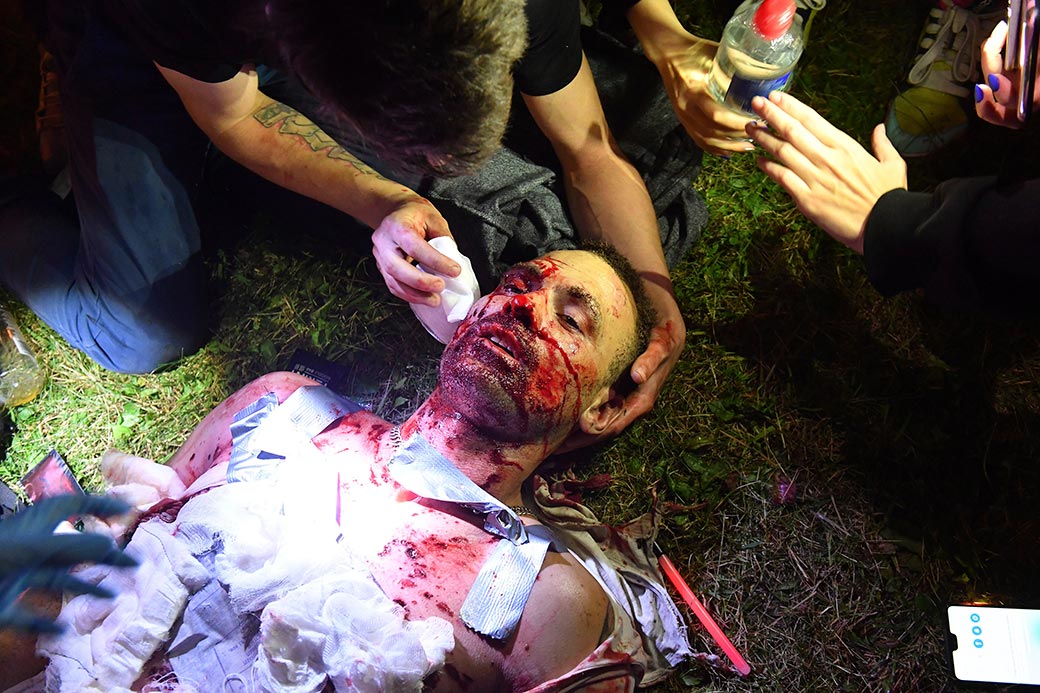
“Young guys next to me were crying with fear. A 20-year-old guy asked me, whispering, how to act during torture, so that it wouldn’t hurt, I told him: ‘The main thing is to not be afraid, because when you are afraid, it hurts even more. Try to disconnect from all this.’ I’m 40 years old – I can do it, but he’s 20, and he can’t, you know?”
According to Fruman, a traffic jam stretching for 1.5 hours, made up of prisoner transports, had built up at the entrance to the Zhodzina detention centre. The guards finally permitted those inside the prison truck to sit on the floor, but Alexander had been beaten so badly that sitting in any position was painful. He elaborated on the kind of psychological “hardening” that riot policemen had gone through, and how they explained their atrocities.
“We sat down more comfortably, and communication began. The OMON soldiers would tell us how bad we were, and how good Lukashenko is. They said that we were being paid $150 each, and as I looked into their eyes, I could see they really believed it.
Then they started explaining their cruel methods. They told us fables about how more than 100 special forces were already in hospitals with broken skulls, and that they were avenging them. I think they were told this purposefully, in order to further enrage them (there is no confirmation of this – “Details”).
I began to turn the conversation towards the Israeli army, in the hope that they might become interested, and less ferocious. I asked them everyday questions – what their salaries were, how much money they needed to live. I tried to divert their attention away from the other, younger guys, as they were asking questions which might anger the guards.”
The first time I heard a human voice was in prison
According to Alexander, those arrested were only able to finally breathe after arriving at the Zhodzina detention centre. Those in charge at the facility for felons behaved far more correctly than their OMON counterparts.
“The Zhodzina officers didn’t beat us at all, I didn’t get hit once. We ran through a corridor and got to the prison yard. The roof was enclosed with metal bars, and a warden was looking down at us from above. This was the first time in 24 hours that I heard a human voice, without screams or curses. He asked us: ‘Guys, are you alright? Got any complaints? I’m going to bring a bucket for those who need to go to the toilet. Bear with us for another half an hour, we’ll assign cells for you, you’ll be able to calm down a bit.’ Hearing that, we all breathed a sigh of relief.”
In Alexander’s prison cell, designed to fit 8 persons, there were 16. All of them had taken part in the protest. It looked like the felons had been transferred elsewhere, and that this had been done in a rush. The new inmates found razor blades and a shank in a secret stash. They flushed them down the toilet right away, to avoid further harm.

During the day, the temperature in the cell reached over 30 degrees Celsius. Those arrested agreed to maintain good hygiene, and washed their bodies with water several times a day. As 16 people had to share four bunk beds, prison staff washed the floor and cladded it with blankets, so that all could sleep.
“We were in remarkable solidarity. Myself and the 35-year-old Andrey were the oldest men in our cell and tried to help the guys arrange everything. We tossed a coin to determine who sleeps where; eight of us got bunk beds, the others the floor. The following night, we swapped. As I was the shortest among us, at 170 cm, I volunteered to sleep on the table so that the others would have more room.
Artyom Shimanskiy, the disabled guy, ended up in our cell. We washed him every day to help him keep cool, as the heat would make him scratch his skin bloody. We spoke with him all the time, to include him. I don’t think he had ever had this many friends before.
On the morning of the 12 August , we got fed for the first time. Artyom ate a lot – perhaps, his condition contributes to this. To make sure he got enough food, we would tell the guards that there was an extra person in the cell, and they would bring another meal.
We fashioned checkers and backgammon games out of bread, talked a lot, about history and philosophy. I shared tales about the army… There were a lot of very smart people in the cell. I got acquainted with distinguished Belarusians, people of various professions.
I also met a journalist from Poland, Kasper. He is a polyglot, knows Russian very well, amongst other languages. We discussed philosophy, culture… He was severely beaten in the Frunzenskiy RUVD, in Minsk, solely on account of being Polish. ‘You, the Poles, came here to ruin our country. In Europe, you are all gays and fa**ots. What are you all coming here for?’ they said to him.
Later, in the pre-trial detention centre in Zhodzina, two men with suitcases came for Kasper. They didn’t introduce themselves but it was clear they were from the Secret Service. They took him away for a conversation, they told him that in fact, Belarusians like Poles, tried to convince him not to share what he had witnessed, but he answered: ‘No, I’m going to tell everything!’, so they took him back.”
“They made us chant ‘Lukashenko is the best president!’”
Those cell-mates of Alexander’s who had spent the night at the Frunzensky RUVD endured the most severe torture.
“I’d been complaining that we were made to stand on all fours with our butts up in the air, all the while they had to lie on the floor, were kicked and forced to scream that Lukashenko is the best president,” says Alexander.
On the 13 August, the process of bringing those arrested before courts started. The judges, according to Alexander, “did not listen to anyone, but instead stamped out sentences.” Those arrested received standard sentences of administrative arrest – from 5 to 15 days. However, nobody came for Alexander. Meanwhile, 72 hours had elapsed, during which, according to the law, a foreign citizen may be kept under arrest.
“I called one policeman over and told him: ‘Listen, what’s going on with me? In another 2 hours, I have to be released, according to the law.’ He responded: ‘It’s a strange story with you – your papers got lost.’ I then realised that I would soon be getting out…
They now wanted to pretend that they didn’t keep me at all! Apparently, they had thought that I had dual citizenship, Israeli and Belarusian. In this case, Belarusian authorities can say: ‘We know nothing, this is a citizen of Belarus’ – and do whatever they want with me. However, I only have Israeli citizenship – I renounced my Belarusian one back in 2002. I used to regret it, but now it had saved me.
Other Israelis, who had not renounced Belarusian citizenship, may well be in Belarusian prisons now.
“I hardly know any Israelis from Belarus, who would refuse a second citizenship,” says Alexander.
“We’ll find each other on Instagram”
When it became clear that the Israeli was being released, his cellmates wrote him detailed lists with their names and phone numbers of relatives. Through the vents, one could hear prisoners from other cells who also shared their contact information.
Alexander agreed with his cellmates that they would find each other on Instagram after their release.
“We came up with a couple of unique hashtags by which we can find each other on Instagram. #PN27PN in Roman alphabet is the hashtag of the guys who were with me in the police van. The hashtag of our cell in Zhodzina is #жодино26ожидайте (in Cyrillic). Our cell number was 26. And ‘ожидайте’ (‘wait’) was the funniest word we’ve heard while inside.”
Alexander Fruman was eventually released, but just as he suspected, he was informed that his passport had been lost.
“Currently, I am without a passport. Tomorrow or the day after tomorrow, the Israeli Embassy should issue me a new passport. Curiously, I saw my passport on the table inside Sovetskiy RUVD amongst a bunch of statements – it was the only one there like it, I recognized it from afar by its cover. It turns out that first, the Belarusian authorities kidnapped an Israeli citizen, and then proceeded to steal his documents.”
Before his release, Alexander spent two hours searching for his belongings from among those of other detainees.
“Six rooms, and in those six rooms are piles of stuff. Phones, shoelaces, shoes, a lot of money, credit cards… Surprisingly, I found my bank cards and cash. Many bills in different currencies.”
The Israeli spent a total of 78 hours in jail. They released him together with a Polish journalist.
“We were being led out through the prison gates. Kasper was nearby. I took him by the shoulder and said: ‘Kasper, this is freedom!’ And then I see that the Polish ambassador is picking him up. And the Israeli one is not there!
I was surprised. I repeatedly told the guys in the cell that I’m from Israel, that my countrymen will tear the place up to protect me. I told them about Naama Isachar, and they were surprised how everyone was intent on helping that girl. But no one from the Israeli embassy came to meet me after I was released.
There were about 500 people waiting for us on the other side of the gate. I came out and everyone reached out their hands to me, each with a photo of their missing loved one on the screen of their phone.”
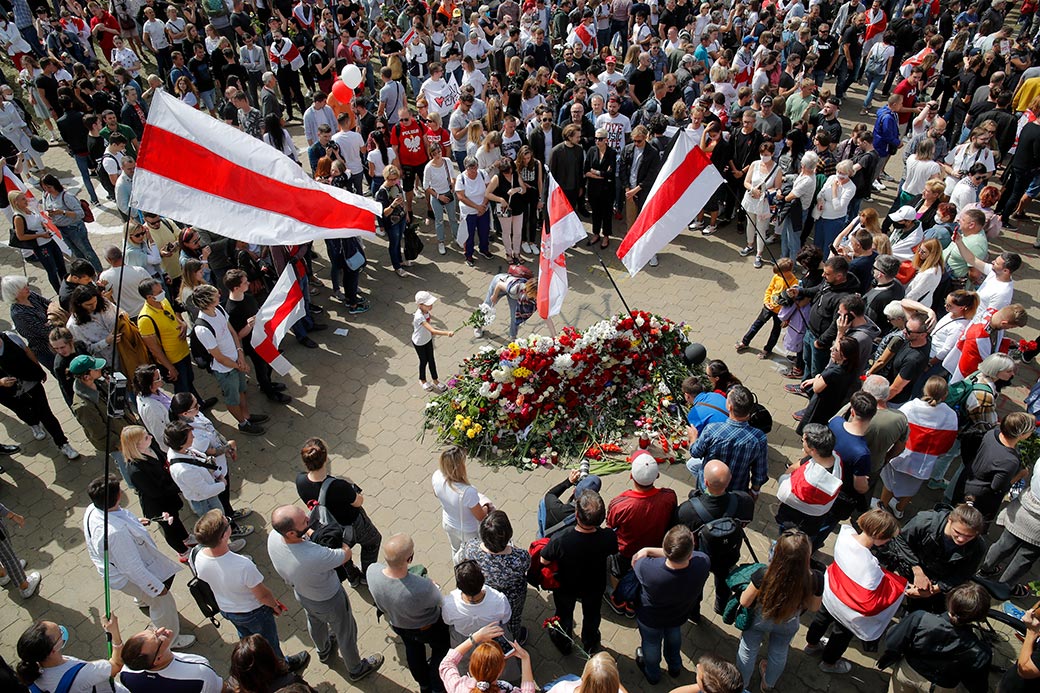
Belarusian law enforcement did not inform the relatives of the arrested where they are being held, they did not post any lists, and many Belarusians still do not know where their nearest and dearest are. Only civil rights activists are able to gather this information, but the authorities are reluctant to cooperate with them.
“I decided that I would go to every person and look at every photo. I did. And I recognised two faces.”
At the conclusion of the conversation, Alexander shared another very personal observation with “Details”.
“I served in the ‘Givati’ brigade for three years, followed by half a year under contract. I served in the 435 ‘Rotem’ battalion and spent all three years in Gaza, in Gush Katif and the places nearby. We used to transport arrested Palestinians. My platoon commander and radio officer were KIA in Gaza. Then, two months later, we found the terrorists who did this and escorted them to detention. But we would never in our lives treat even terrorists the way the Belarusian OMON treated their own people.”
Not the end
Alexander Fruman and his family are still in Belarus. He continues communicating with the media. He believes it is his mission to tell the world about what goes on in Belarusian prisons. As of now, Alexander’s relatives have moved him to a safe hideout.
We hope that Israel’s Ministry of Foreign Affairs will provide assistance to those Israelis with dual citizenship who are still held in Belarusian prisons.